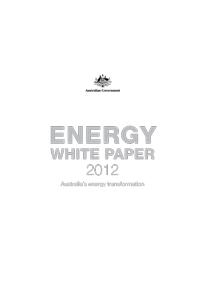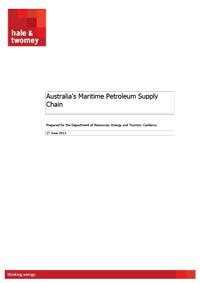Resources
Date
Description
There is an extensive range of Federal, State/Territory and Local government regulations and legislation applying to refineries and businesses operating in the downstream petroleum industry. Some of the key regulations are outlined below. Formal Price Monitoring On 17 December 2007, under…Date
Description
The NOSEC is a committee of the Ministerial Council on Energy (MCE) and provides the main executive channel through which Commonwealth and State Governments formulate their overall management response to a national liquid fuel emergency. The task of the NOSEC is to ensure that the Federal…Date
Description
Transport fuel imports do not increase risk for supply reliability and security A diversity of global supply sources and local import facilities provide a range of options for Australia. Australia is already dependent on imports to meet the growth in demand for transport fuels (eg. demand…Date
Description
Subsidising domestic alternative fuel production is not necessary for energy security The reliable supply of conventional transport fuels (petrol, diesel and jet fuel) to the Australian market is underpinned by a diversity of supply options for petroleum products from domestic refiners and…Date
Description
AIP member companies provide very reliable supplies of fuel to the Australian market and: represent around 90% of primary fuel supply to the Australian market, have decades of operational experience in Australia and Asia delivering high quality fuel to customers, have major…Date
Description
Through submissions to review processes, AIP aims to inform the community about the downstream petroleum industry, and its significance to the national economy, by making available comprehensive factual information and data about the industry and its performance over time. AIP material also…Date
Description
Liquid Fuel Supply Security and Reliability The Australian liquid fuel supply chain has considerable span and diversity. It includes crude and petroleum product shipments into and around Australia, refinery throughput, bulk fuel storage tanks, extensive terminal and distribution networks, over…Date
Description
Australia’s import, terminal and storage capacity for transport fuel has increased over time to meet growth in fuel demand There has been significant investment in new and expanded storage and terminal facilities over recent years to meet demand growth in key regional centres, as evidenced in…
Date
Description
On 8 November 2012, the Australian Government released the 'Energy White Paper - Australia's Energy Transformation'. The 2012 Energy White Paper sets out the Australian Government's strategic policy framework to guide Australia's energy transformation to a cleaner and more productive energy economy…
Date
Description
In 2013, Hale and Twomey was engaged by the Federal Department of Resources, Energy and Tourism (DRET) to examine and report on the maritime supply chain and the key role it plays in Australia's petroleum supply chain. The report considers how the maritime supply chain operates for Australia and…